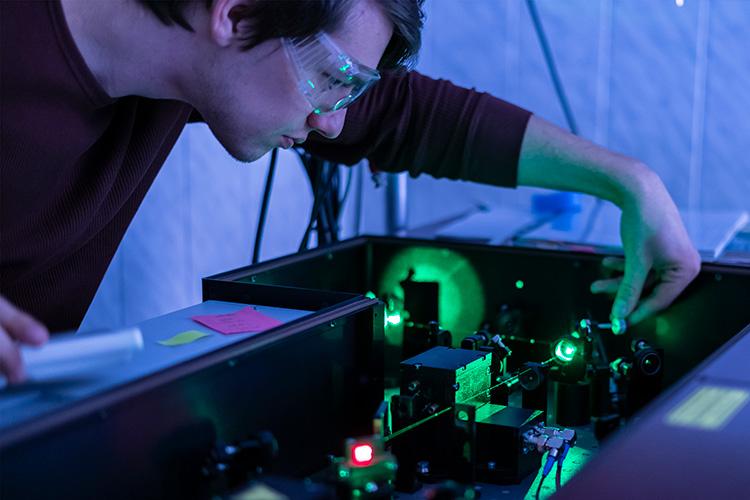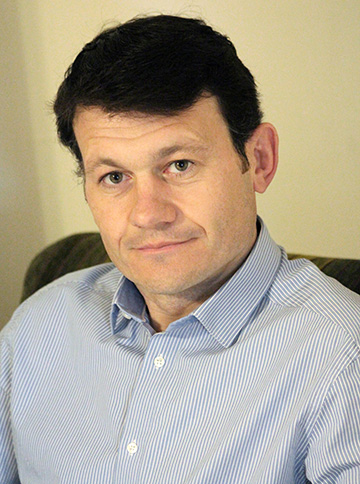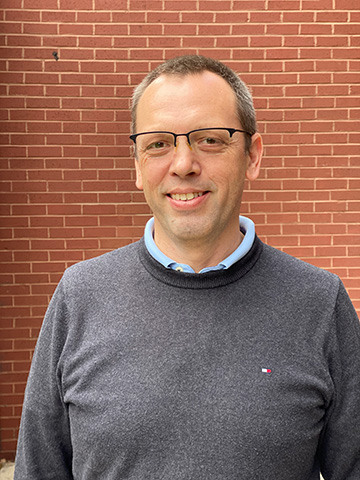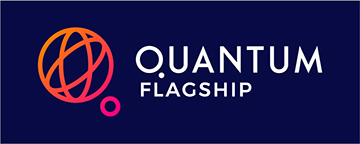
[Image: iStock / Getty Images]
Editor’s Note: The past several months have seen a flurry of activity in Europe—in the United Kingdom, at the EU level, in various member states—supporting research and infrastructure development in quantum science and technology. To learn more about the funding and where it’s going, OPN recently chatted with OSA Europe directors Yann Amouroux and Claus Roll, and with the society’s senior industry advisor, Tom Hausken.
Worldwide, we’re seeing a huge amount of excitement, including among governments, in quantum technology, and Europe is jockeying for position in this race. Is it your impression that everybody is going after “quantum” generally? Or are there specific pieces of quantum that certain countries are especially competing for?
Yann Amouroux: That’s not the impression I’m getting. Everyone plays to their own strength, of course, but I don’t have a feeling that the U.K. or Germany or France have decided, “This is what we’re going for.” Personally, I think the U.S. is probably much more about quantum computing, because of the presence of companies like Google and IBM and the like.
Tom Hausken: The point about Google and Microsoft and Amazon and IBM is a good one—they may have labs in Europe, but they’re U.S. companies and they’re involved in computing.
To add to that, though, one big driver in all of this, wherever it’s happening, is the fear of missing out—or, as they say on Wall Street, “downside risk mitigation.” The fear of missing out applies particularly to quantum computing and quantum key distribution (QKD). If you’re a country, you would have a motive to try to keep up in those areas, if only for national-security reasons.
“One big driver in all of this is the fear of missing out—or, as they say on Wall Street, ‘downside risk mitigation.’ ”
—Tom Hausken
Claus Roll: Some figures in a report of the German Academy of Sciences and Engineering have some interesting things to say on this. For example, it looks at patents per country, and breaks out the domains of quantum and the countries that are doing work in these domains. Definitely, in quantum computing, it’s the United States, followed by Japan. Whereas in cold-atom interferometry, which is used in quantum sensing, China is in the lead, the U.S. second, and Japan almost disappears. So there are distinctions.
With respect to the “fear of missing out” that Tom talked about, part of what’s driving things in Europe is that Europe wants to get a kind of autonomy—they call it “digital sovereignty.” And this is why they are launching all these projects; they want to be self-sustainable, producing their own computers, not depending on others. Will it come? We will see.
Let’s drill down to what specific countries are doing—starting with the U.K., which has been a leader in this area.
Amouroux: That’s right. The U.K. has had this 10-year plan that everybody is aware of, and celebrated the fact, at the end of 2020, that they’ve gone through the first half and are now looking at the second. From what one can gather, the government is focused on applications, rather than just funding research for the sake of research. QKD has definitely been one of the areas where they are probably a bit ahead of everybody in Europe in that respect. There’s a very good program, and I think they’re starting to see ways of monetizing it.
The biggest disrupter for the program for the next five years will be Brexit. But that will be mainly in the country’s relationships with its neighbors. In terms of spending and what money has been set aside, that’s probably not going to change massively. I think the U.K. has been quite transparent in how they work and what they’ve been doing. But they’re also kind of changing tack a little bit and adapting to shifting winds.
Sailing the (Quantum) Flagship
Looking across the Channel, the European Union has its own set of programs, both at the EU level and the country level. One that’s been around for several years is the EU’s Quantum Flagship, a 1 billion euro initiative, spread over ten years. What’s the importance of that, vis-à-vis the programs of individual EU member states?
Roll: One of the big differences between the Quantum Flagship and all these national initiatives in Europe is that the Quantum Flagship is working on cross-border collaborations. You have projects where you have teams from Sweden, Italy, Germany, whatever country.
For the programs of member states, on the other hand, they really try to have as high a percentage as possible of the teams, even up to 100%—be it industry or universities or research institutions—all from the same country. Obviously, that’s good with respect to communicating with taxpayers; the governments have to explain that they’re not giving money to outsiders, and that is understandable. But you don’t necessarily find the best people for a given project in that sense. You don’t have that problem with the European Quantum Flagship, which is working across borders. So that’s one point.
The other important point is that the Flagship helps especially the smaller countries, which might have high-level industry and research—sufficient scientific power to contribute—but which cannot afford big investments. For them, that’s a really good program.
Hausken: One of the biggest values of programs like this, too, is that they sort of help market the whole idea. So if we hear in the United States that there’s a European Flagship program, we can say, “Hey, we need to have a National Quantum Initiative”; and then a year from then, in Europe, they say “Oh, look, the U.S. has a National Quantum Initiative; we need to have a German program or a French program.” And, of course, every country does this in their own way. All of these national initiatives have their advantages and disadvantages.
With respect to the Quantum Flagship, I suppose one key point is that it was developed in the EU’s previous funding framework program, Horizon 2020, which covered the years from 2014 to 2020. There’s a new program, Horizon Europe, that now covers the next seven years.
Amouroux: Yes, and Horizon Europe is putting a lot more accountability on the spending and the return on investment than previous initiatives, where it was all about research. Now it’s about not only research—it’s about, What are you going to do with it?
And within that is another set of programs, the European Innovation Council (EIC), which is really kind of looking at industry—it’s not just quantum, but there is a lot of research money and budgets to be spent, and people are looking at how they can get that money back through industry development. And interestingly, the U.K. is not part of the EIC’s latest accelerator funding to scale-up startups, which is a new part of the Horizon Europe program.
EU member states
Let’s dig into some of the initiatives of individual EU member states, where there seems to have been a lot of activity lately. The German government has put something on the table recently on quantum computing—Claus, can you walk us through that at a high level?
Roll: It actually started nearly 12 months ago, when the German government announced that its COVID recovery program would include quantum technology as a long-term investment area, and they allocated 2 billion euros for that. They presented a quantum technologies agenda in January 2021 and were looking at where they wanted to be in 2030 in this area, and what they had to do to get there.
“Nearly 12 months ago, the German government announced that its COVID recovery program would include quantum technology as a long-term investment area ... Then, within the past few months, two announcements were issued on how the 2 billion euros will be spent.”
—Claus Roll
Then, within the past few months, two announcements were issued on how the 2 billion euros will be spent. One was from the German Ministry of Research and Education, which now has a budget of 1.1 billion euros to support research and development in quantum technologies. And the other part of this huge budget, nearly 900 million euros, will be spent by the German Ministry of Economy. Most of the money there will go to the German Aerospace Center, which will be tasked with setting up an “industry ecosystem,” so that the knowledge that comes from research into companies will go into something sustainable.
That is at the federal level. We also see some individual German states—like Bavaria and Lower Saxony—that have created their own “Quantum Valleys.” These are quantum clusters where the states spend a lot of money—in Bavaria, up to 300 million euros—to strengthen the research and the industry in their regions. And with this initial funding, they also hope to benefit from further federal funding.
Where else have we seen interesting activity at the individual-state level?
Amouroux: I think in Europe recently, a big surprise came from France. It had announced in early 2020 that it was going to make a large investment in research, but nothing happened. And then, out of the blue, Emmanuel Macron, the president, decided in March 2021: This is it; we’re going to have this multibillion-euro program.
Of course, it is partly a political move, because there are elections next year. Will the political promises made actually happen in real life? I don’t know; time will have to tell. But it’s really interesting.
And that’s what’s happening with just the big state players; there are some smaller ones, and some less financially strong member states. Italy is copying what’s happening in Germany and France and is also looking at what the U.K. is doing. It is starting to have this consortium idea of “quantum hubs,” around Trento and Rome and Naples and Florence, where there are currently a lot of people who do really interesting stuff, but they never quite get together. They’re trying to do this on a very limited budget, and they are getting some support from the regions, but it never quite makes the news.
It’s a fear of missing out as much as anything else, as Tom said. But it’s also realizing, We’re not working together; we’re not being clever here.
“I think in Europe recently [in quantum], a big surprise came from France.”
—Yann Amouroux
Hausken: It’s telling that the title of the initial report in France that kicked this off, at the beginning of 2020, even focused, as I recall, on “not getting left behind.”
Amouroux: Yes—the French expression is rater le virage … it translates roughly into “missing the turn.” The upshot was that France is determined not to “miss the turn” in quantum technology.
Building an ecosystem
Claus, you mentioned that German spending was partly going toward building a technology ecosystem, which is another big buzzword in quantum and has been something of a hurdle in the past. There’s an EU-level initiative, the European Quantum Industry Consortium (QUIC). What’s the nature of that?
Roll: This is an effort that’s being set up at the moment, and that has a number of important industry leaders on its board, as well as some of the people who advocated originally for the Quantum Flagship. And it appears that the European Commission is expected to be one of the main partners, which suggests that the effort is serious. The aim, as you said, is to set up the required quantum industry ecosystem for Europe to be a player here.
From the European Commission perspective, it is expected that QUIC will draft a quantum technology innovation roadmap that will form the basis of EC’s planned investments. It’s also hoped that QUIC will promote private investments in these technologies and play a key role in the ecosystem building and in standardization.
In another effort, just recently, a German initiative, the Quantum Technology and Application Consortium (QUTAC), was launched. The aim of that consortium—which includes some of the largest German companies—is to identify potential large-scale industrial applications and how to bring them to market.
Amouroux: And looking at QUIC, once again, it is an EU program. So if funding is made available for ecosystem development from QUIC, the countries involved will really need to demonstrate that they’re going to work across borders.
But as mentioned earlier, the U.K. is excluded specifically from any of those. That could be a problem—while the U.K. is, like Israel and Switzerland, still involved in the ERC grant general policy, these countries can’t take part in this consortium. That’s partly, perhaps, about the EU trying to protect its position and also, as mentioned before, about demonstrating to the taxpayers that funds aren’t being squandered.
I suppose it could be argued that the U.K., too, has been very interested in developing its own industrial economy. One doesn’t get the sense that its government is particularly interested in inviting Europe in on that part of things.
Amouroux: Yes, that’s true. On the one hand, when they engage in negotiations with individual countries like France or the Netherlands, the U.K. is all about saying that they are interested in collaborating. But the U.K. is also really viewing itself as a free agent in light of Brexit.
The positive side of that is that the U.K. is really feeling that it can do what it wants to. For example, it has just announced a free-trade agreement with Australia, which has nothing to do with Europe. The sense seems to be: We can’t negotiate with Europe, but we can have agreement with other players like Australia.
The more negative side may have to do with recruiting and getting people in in the future. When you look at the faculties in the U.K., up to now, half of the staff was EU staff. It’s not going to be like that anymore. It’s also going to get much more difficult to attract students. And it’s going to be much more difficult to attract people to come to the U.K., because the picture is not quite clear on how immigration will work in a post-Brexit world.

“COVID has been very disruptive, and because of that, we haven’t quite felt the impact of Brexit on travel. That’s going to start to change in the next three to six months.”
—Yann Amouroux
COVID has been very disruptive, and because of that, we haven’t quite felt the impact of Brexit on travel. That’s because people haven’t been traveling freely due to the pandemic. That’s going to start to change in the next three to six months, and this is where the more problematic side of Brexit may start to show its face.
So one big impact is just in terms of the movement of talent from across the two polities.
Amouroux: Yes. And this is an area where I think countries like the Netherlands and Belgium have been very clever in aligning themselves with respect to the U.K.. The way it seems is that they can see that if people aren’t going to go to study in the U.K., they have to go to other countries, and these two represent opportunities because “We’re not forcing you to learn Dutch or Flemish; we’re already teaching in English.”
And I know they’re going to attract a lot of good people. There are already excellent programs in Delft and Eindhoven, as well as in Belgium, such as Brussels VUB and with PhotonHub, an EU-sponsored program that could be massive. So in my view, at least, they’re going to attract some people that might otherwise have chosen to be in the U.K.
Roll: And the Netherlands is interesting in another way, for its recent commitment to quantum ecosystem development. They have just announced a program called Quantum Delta, which takes off from their already-existing Photon Delta model. It’s a very close collaboration among industry, universities and research institutions. And the country has the advantage of the institutions involved being geographically very close, which simplifies collaboration.
The Netherlands government’s national growth fund is pumping 615 million euros into this Quantum Delta program to build an industrial ecosystem. And they are building on existing structures and existing networks and existing mechanisms of technology transfer from Photon Delta that will help a lot in setting this up. This is a successful model. They are now replicating it in quantum industry technology.
Another topic—perhaps a subtopic of ecosystem development—is the quantum workforce. Are there specific programs in Europe that are purposefully targeted at that sort of education and training?
Roll: I can think of two particular examples; I’m sure there are more. At the country level, for example, in Germany, education and training of engineers and the workforce are an integral part of the quantum agenda the country has articulated, and the government has described how it wants to build that up, from school to university into industry, and keep everything at a targeted level so that the workforce is sufficient. That’s one example at the country level.
At the EU level, it’s also there in aspects of the Quantum Flagship, and at a higher level in the different grants via the ERC that exist for younger scientists. And these also help to train the workforce.
Amouroux: Some universities in the U.K. already have a quantum element in some of their degrees; that’s now coming a bit more to the fore and becoming more obvious. And it’s being replicated elsewhere; in Trento University in Italy, they’re also developing a quantum-focused degree. So it’s happening. And there’s also a lot of talk on how to attract high-school kids into doing science. Quantum is good for that; it’s an area that’s cool and interesting.

“Workforce development is definitely something that all of these programs have to include. But it’s a really hard problem.”
—Tom Hausken
Hausken: Workforce development is definitely something that all of these programs have to include. But it’s a really hard problem, right? You might be able to solve an ion trap problem; you might be able to get some qubits to work together in the lab. But to train the next generation of quantum scientists? That is a huge, long problem.
But I was recently at a conference that focused in part on this question, which comes up over and over. And what people were saying was that they didn’t necessarily need more quantum physicists. What they really need are all these other engineers to support that. They need experts in packaging, cryo, photonics of course. Control electronics turns out to be a very, very big deal; they need to have a supercomputer next to the quantum computer, just to do the controls.
So it turns out, you need all these engineers. They don’t necessarily need to know much about quantum; the companies and institutions say they can teach them the quantum they need to know. But there’s a need to have all these people come together. Sure, it’s a quantum workforce problem. But it’s also just a workforce problem.
From today to tomorrow
These initiatives all look toward the quantum future in Europe. What about the quantum present?
Amouroux: Within Europe, you do see companies growing progressively, driven partly by quantum. M Squared, in Scotland, is a very good example. ID Quantique, in Switzerland, is also quite strong, and Toptica, in Germany, is benefiting. It’s just a question of being there at the right time and in the right place.
Hausken: And with the right product. These companies are some of the ones that are selling the “picks and shovels” for the quantum business—not quantum technology as such, but the components that everyone needs to do quantum science. I remember when ID Quantique was doing this a long time ago. Superficially, it seemed that there was no market for what they were selling. But, of course, everybody doing quantum science needed, say, single-photon detectors, and ID Quantique had those. So they could make money.
Roll: Another very interesting thing we see now is that there are players coming into these discussions that one doesn’t necessarily expect—like pharmaceutical companies, which are becoming very involved in quantum computing. They need it as a customer, but I wouldn’t have expected them to enter into the game in the early stages of quantum computing. But if the technology turns out to work, early adopters will have a tremendous advantage over those who come in later. They will have time, for example, to develop algorithms for their molecular simulations, for finding new molecules and medicines.

“Another very interesting thing we see now is that there are players coming into these discussions that one doesn’t necessarily expect—like pharmaceutical companies.”
—Claus Roll
In the automotive industry, companies like Bosch are also getting engaged. It will be interesting to see what will come out of this exploration—will they be big players, or just clients at the end?
That’s an interesting point—you now have potential clients viewing themselves as stakeholders in the research and development being done.
Hausken: I’m going to express a certain skepticism about that. Again, I think what you’re really seeing here is downside risk mitigation. If you’re a Wall Street bank, putting somebody part time or full time on this is not a big deal. Because you really don’t want to miss out.
It’s certainly true that having potential customers coming in, speaking at conferences about their interest, has to count for something. Five or ten years ago, you didn’t have that.
But you have to be careful not to oversell this. Recently, at a conference sponsored by the U.S. National Science Foundation about progress on fault-tolerant quantum computers, the consensus was that they’re very far away. And if you oversell it, people start talking about a “quantum winter” of disappointment, where it’s hard to sell the concept at all.
Roll: There seem to be two things in what you’re saying. The first is, Will we reach, at some point, something that really works? And the second is, Will we find a product that we can actually sell?
Hausken: Yes. The Concorde could fly; it just wasn’t profitable. When you’re all done, you still have to show that you have something that will not just solve a problem, but is effective enough that people will pay for it.
But there’s another way to look at this. Toward the end here, we’ve been talking a lot about quantum computing. The people who are working on quantum sensing would say, Oh, there’s already a lot of commercial quantum sensing stuff out there, and more to come. Looking at it from that point of view, or even from the point of view of QKD, you might have a whole different feeling that’s much more optimistic, in the near term, than for quantum computing. But computing is what everyone talks about.
Roll: A parting thought, perhaps, is that we talked mainly about the U.K. and the European Union. We didn’t talk about other countries like Switzerland, which is very associated with the European Union; about Russia and other countries in eastern Europe (whether in the EU or not); or even Norway, which is also not in the EU. Several of these are small countries in size and maybe also in terms of market, so their projects may not be quite so well known. But they may be worth watching.


